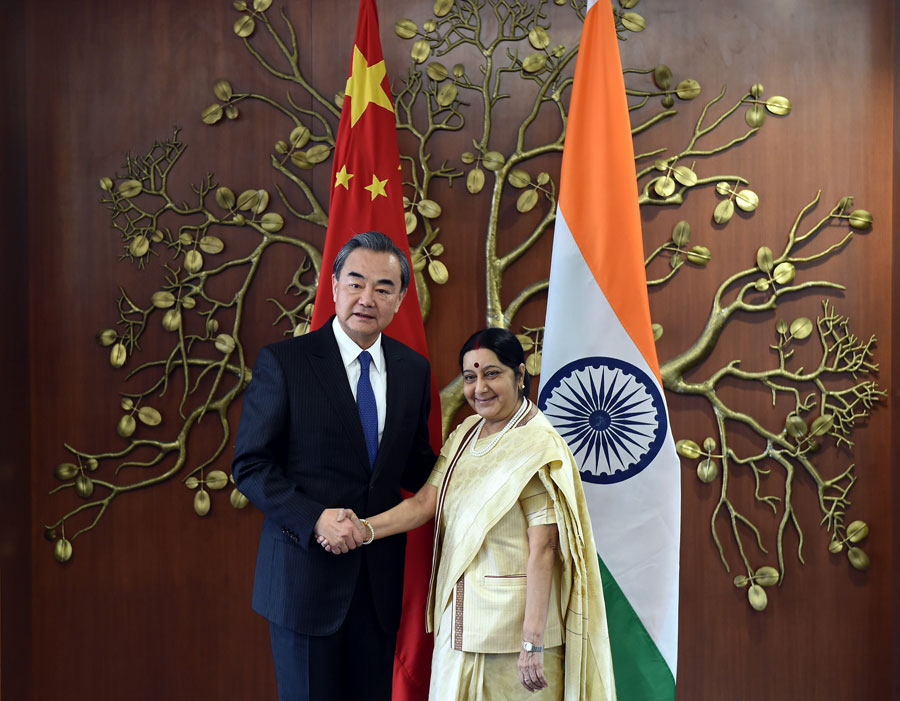Reflecting on Sino-India ties in 2018
- By Sajjad Malik
 0 Comment(s)
0 Comment(s) Print
Print E-mail China.org.cn, January 5, 2018
E-mail China.org.cn, January 5, 2018
Foreign Minister Wang Yi visited New Delhi in December last year to attend the India-China-Russia trilateral talks. This was the first top-level official Chinese visit to India after the Donglang (Doklam) standoff that brought the two Asian giants to the precipice.

It was a powerful signal that China was ready for a new beginning in ties by moving forward from the border tensions of 2017. The visit also reflects China's traditional commitment to a peaceful neighborhood, needed to maintain the trajectory of growth.
Wang spelled out policy in an article published in the Indian newspaper Deccan Herald on December 11, writing that China was working "to maintain stability in our neighborhood and the sound momentum of regional cooperation." He also said China was willing to build sound ties with all neighboring nations, including Japan and South Korea.
Wang used warm words in talking about India, arguing that "both being big developing countries, China and India have far greater shared strategic interests than concrete differences, and far greater need for cooperation than partial frictions."
China "values the good-neighborliness and friendship between the two countries as we are each other's big neighbors and both ancient civilizations."
The Chinese foreign minister predicted a great future for ties if there was good communication between the two countries. "We believe that, as long as we continue to engage in in-depth strategic communications and promptly dispel strategic misgivings, the strategic value of China-India cooperation will speak for itself, and there will be a prospect of 'the Dragon and the Elephant Dancing Together' and the '1+1=11' effect as expected by our leaders."
These were indeed warm words far removed from the Donglang incident, which fortunately was handled peacefully. There's no doubt that China and India can offer a lot to their own people, the region and the world, if they make joint efforts for peace and prosperity.
However, this may be too big an expectation in the prevailing conditions. China is developing fast and will soon graduate as a major power and take up several roles in the coming years, previously reserved for the United States. After managing its economic advance, China is spreading out and the success of Belt and Road Initiative (BRI) is a powerful testimony to that.
India is also aspiring for a large role with the improvement in its economic statistics. However, it has a long way to go in terms of realizing its right place in the world. Though, its size and future economic prospects, along with the resurgence of Hindutva nationalism and love for certain past glories keep it from pursuing a global role.
It has played cards well by using American influence and propaganda power in its favor, but it may not be able to fulfill American wishes for a strategic role of Washington's choice. The Americans have a bad habit of mercilessly using their allies for its own vested interests and then shifting sides in case of failure or strong strategic disagreement.
Recently, India has been in the forefront in opposing China-Pakistan Economic Corridor, which is a flagship project under the BRI. Already several schemes under the CPEC are nearing completion.
It has helped Pakistan to manage chronic electric power shortages in record time of less than five years. Several mega infrastructure projects are also changing the Pakistan landscape.
The CPEC is an economic and strategic project offering China its shortest link with the Middle East, North Africa and Europe. But China has said the CPEC is not limited to Pakistan, and other nations can join it. If India, Iran, Afghanistan and Central Asian States became part of it, the entire outlook of South and Central Asia regions would change.
India should realize that, by opposing the CPEC, it is playing a strategic game potentially good for some living far away but not for the region. So, Indian leaders have to make a choice. Hopefully India can adjust its policies, as traditionally it has avoided acting as proxy for big powers and should do so again.
A truly cooperative Sino-India relationship would be good for both and the periphery. Let us see if India becomes part of efforts to contain China or maintains freedom of action. India's polices will determine the nature of its ties with China in 2018 and afterwards.
Sajjad Malik is a columnist with China.org.cn. For more information please visit:
http://www.china.org.cn/opinion/SajjadMalik.htm
Opinion articles reflect the views of their authors, not necessarily those of China.org.cn.






Go to Forum >>0 Comment(s)